formerly eScholarship Editions


|
|
|
|
Your search for
'History' in subject
found 514 book(s). | Modify Search | Displaying 161 - 180 of 514 book(s) | |
| 161. |  | Title: America calling: a social history of the telephone to 1940 Author: Fischer, Claude S 1948- Published: University of California Press, 1994 Subjects: History | Sociology | United States History | Technology and Society | History and Philosophy of Science | American Studies Publisher's Description: The telephone looms large in our lives, as ever present in modern societies as cars and television. Claude Fischer presents the first social history of this vital but little-studied technology - how we encountered, tested, and ultimately embraced it with enthusiasm. Using telephone ads, oral histories, telephone industry correspondence, and statistical data, Fischer's work is a colorful exploration of how, when, and why Americans started communicating in this radically new manner.Studying three California communities, Fischer uncovers how the telephone became integrated into the private worlds and community activities of average Americans in the first decades of this century. Women were especially avid in their use, a phenomenon which the industry first vigorously discouraged and then later wholeheartedly promoted. Again and again Fischer finds that the telephone supported a wide-ranging network of social relations and played a crucial role in community life, especially for women, from organizing children's relationships and church activities to alleviating the loneliness and boredom of rural life.Deftly written and meticulously researched, America Calling adds an important new chapter to the social history of our nation and illuminates a fundamental aspect of cultural modernism that is integral to contemporary life. [brief] Similar Items |
| 162. |  | Title: Bottled poetry: Napa winemaking from Prohibition to the modern era Author: Lapsley, James T Published: University of California Press, 1997 Subjects: History | California and the West | United States History | Californian and Western History | Viticulture | Wine Publisher's Description: California's Napa Valley is one of the world's premier wine regions today, but this has not always been true. James Lapsley's entertaining history explains how a collective vision of excellence among winemakers and a keen sense of promotion transformed the region and its wines following the repeal of Prohibition. Focusing primarily on the formative years of Napa's fine winemaking, 1934 to 1967, Lapsley then concludes with a chapter on the wine boom of the 1970s, placing it in a social context and explaining the role of Napa vineyards in the beverage's growing popularity.Names familiar to wine drinkers occur throughout these pages - Beaulieu, Beringer, Charles Krug, Christian Brothers, Louis Martini, Inglenook - and the colorful stories behind the names give this book a personal dimension. These strong-willed, competitive winemakers found ways to work cooperatively, both in sharing knowledge and technology and in promoting their region. The result was an unprecedented improvement in wine quality that brought with it a new reputation for the Napa Valley.In The Silverado Squatters , Robert Louis Stevenson refers to wine as "bottled poetry," and although Stevenson's reference was to the elite vineyards of France, his words are appropriate for Napa wines today. Their success, as Lapsley makes clear, is due to much more than the beneficence of sun and soil. Craft, vision, and determination have played a part too, and for that, wine drinkers the world over are grateful. [brief] Similar Items |
| 163. | 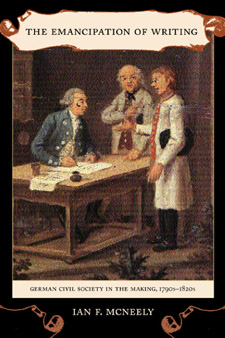 | Title: The emancipation of writing: German civil society in the making, 1790s-1820s Author: McNeely, Ian F 1971- Published: University of California Press, 2003 Subjects: History | European Studies | German Studies | European History | Sociology | Political Theory | Anthropology Publisher's Description: The Emancipation of Writing is the first study of writing in its connection to bureaucracy, citizenship, and the state in Germany. Stitching together micro- and macro-level analysis, it reconstructs the vibrant, textually saturated civic culture of the German southwest in the aftermath of the French Revolution and Napoleon's invasions. Ian F. McNeely reveals that Germany's notoriously oppressive bureaucracy, when viewed through the writing practices that were its lifeblood, could also function as a site of citizenship. Citizens, acting under the mediation of powerful local scribes, practiced their freedoms in written engagements with the state. Their communications laid the basis for civil society, showing how social networks commonly associated with the free market, the free press, and the voluntary association could also take root in powerful state institutions. [brief] Similar Items |
| 164. |  | Title: The widening gate: Bristol and the Atlantic economy, 1450-1700 Author: Sacks, David Harris 1942- Published: University of California Press, 1991 Subjects: History | Renaissance History | European History | United States History Similar Items |
| 165. |  | Title: Hysteria beyond Freud Author: Gilman, Sander L Published: University of California Press, 1993 Subjects: History | Literature | Women's Studies | Psychiatry | Medicine Publisher's Description: "She's hysterical." For centuries, the term "hysteria" has been used by physicians and laymen alike to diagnose and dismiss the extreme emotionality and mysterious physical disorders presumed to bedevil others - especially women. How has this medical concept assumed its power? What cultural purposes does it serve? Why do different centuries and different circumstances produce different kinds of hysteria?These are among the questions pursued in this absorbing, erudite reevaluation of the history of hysteria. The widely respected authors draw upon the insights of the new social and cultural history, rather than Freudian psychoanalysis, to examine the ways in which hysteria has been conceived by doctors and patients, writers and artists, in Europe and North America, from antiquity to the early years of the twentieth century. In so doing, they show that a history of hysteria is a history of how we understand the mind. [brief] Similar Items |
| 166. | 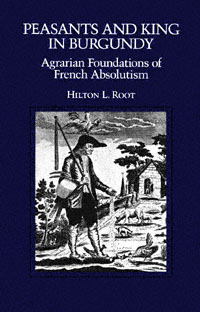 | Title: Peasants and king in Burgundy: agrarian foundations of French absolutism Author: Root, Hilton L Published: University of California Press, 1992 Subjects: History | European History | Politics | French Studies Publisher's Description: The example of Old Regime France provides a source for many of the ideas about capitalism, modernization, and peasant protest that concern social scientists today. Hilton Root challenges traditional assumptions and proposes a new interpretation of the relationship between state and society. Similar Items |
| 167. |  | Title: Insatiable appetite: the United States and the ecological degradation of the tropical world Author: Tucker, Richard P 1938- Published: University of California Press, 2000 Subjects: History | Ecology Publisher's Description: In the late 1800s American entrepreneurs became participants in the 400-year history of European economic and ecological hegemony in the tropics. Beginning as buyers in the tropical ports of the Atlantic and Pacific, they evolved into land speculators, controlling and managing the areas where tropical crops were grown for carefully fostered consumer markets at home. As corporate agro-industry emerged, the speculators took direct control of the ecological destinies of many tropical lands. Supported by the U.S. government's diplomatic and military protection, they migrated and built private empires in the Caribbean, Central and South America, the Pacific, Southeast Asia, and West Africa. Yankee investors and plantation managers mobilized engineers, agronomists, and loggers to undertake what they called the "Conquest of the Tropics," claiming to bring civilization to benighted peoples and cultivation to unproductive nature. In competitive cooperation with local landed and political elites, they not only cleared natural forests but also displaced multicrop tribal and peasant lands with monocrop export plantations rooted in private property regimes. This book is a rich history of the transformation of the tropics in modern times, pointing ultimately to the declining biodiversity that has resulted from the domestication of widely varied natural systems. Richard P. Tucker graphically illustrates his study with six major crops, each a virtual empire in itself - sugar, bananas, coffee, rubber, beef, and timber. He concludes that as long as corporate-dominated free trade is ascendant, paying little heed to its long-term ecological consequences, the health of the tropical world is gravely endangered. [brief] Similar Items |
| 168. | 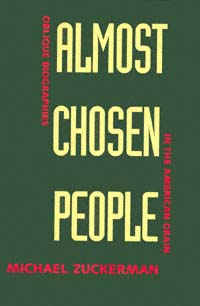 | Title: Almost chosen people: oblique biographies in the American grain Author: Zuckerman, Michael 1939- Published: University of California Press, 1993 Subjects: History | Politics | United States History | American Literature | American Studies Publisher's Description: Few historians are bold enough to go after America's sacred cows in their very own pastures. But Michael Zuckerman is no ordinary historian, and this collection of his essays is no ordinary book.In his effort to remake the meaning of the American tradition, Zuckerman takes the entire sweep of American history for his province. The essays in this collection, including two never before published and a new autobiographical introduction, range from early New England settlements to the hallowed corridors of modern Washington. Among his subjects are Puritans and Southern gentry, Benjamin Franklin and Benjamin Spock, P. T. Barnum and Ronald Reagan. Collecting scammers and scoundrels, racists and rebels, as well as the purest genius, he writes to capture the unadorned American character.Recognized for his energy, eloquence, and iconoclasm, Zuckerman is known for provoking - and sometimes almost seducing - historians into rethinking their most cherished assumptions about the American past. Now his many fans, and readers of every persuasion, can newly appreciate the distinctive talents of one of America's most powerful social critics. [brief] Similar Items |
| 169. |  | Title: Pulling the devil's kingdom down: the Salvation Army in Victorian Britain Author: Walker, Pamela J 1960- Published: University of California Press, 2001 Subjects: History | Christianity | Victorian History | Religion | Women's Studies Publisher's Description: Those people in uniforms who ring bells and raise money for the poor during the holiday season belong to a religious movement that in 1865 combined early feminism, street preaching, holiness theology, and intentionally outrageous singing into what soon became the Salvation Army. In Pulling the Devil's Kingdom Down, Pamela Walker emphasizes how thoroughly the Army entered into nineteenth-century urban life. She follows the movement from its Methodist roots and East London origins through its struggles with the established denominations of England, problems with the law and the media, and public manifestations that included street brawls with working-class toughs. The Salvation Army was a neighborhood religion, with a "battle plan" especially suited to urban working-class geography and cultural life. The ability to use popular leisure activities as inspiration was a major factor in the Army's success, since pubs, music halls, sports, and betting were regarded as its principal rivals. Salvationist women claimed the "right to preach" and enjoyed spiritual authority and public visibility more extensively than in virtually any other religious or secular organization. Opposition to the new movement was equally energetic and took many forms, but even as contemporary music hall performers ridiculed the "Hallelujah Lasses," the Salvation Army was spreading across Great Britain and the Continent, and on to North America. The Army offered a distinctive response to the dilemmas facing Victorian Christians, in particular the relationship between what Salvationists believed and the work they did. Walker fills in the social, cultural, and religious contexts that make that relationship come to life. [brief] Similar Items |
| 170. |  | Title: The Languages of psyche: mind and body in Enlightenment thought: Clark Library lectures, 1985-1986 Author: Rousseau, G. S. (George Sebastian) Published: University of California Press, 1991 Subjects: History | Medicine | History and Philosophy of Science | European History | European Literature Publisher's Description: The Languages of Psyche traces the dualism of mind and body during the "long eighteenth century," from the Restoration in England to the aftermath of the French Revolution. Ten outstanding scholars investigate the complex mind-body relationship in a variety of Enlightenment contexts - science, medicine, philosophy, literature, and everyday society. No other recent book provides such an in-depth, suggestive resource for philosophers, literary critics, intellectual and social historians, and all who are interested in Enlightenment studies. [brief] Similar Items |
| 171. | 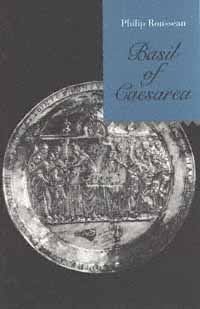 | Title: Basil of Caesarea Author: Rousseau, Philip Published: University of California Press, 1995 Subjects: History | Religion | Classics | Ancient History | Christianity | Classical Religions Publisher's Description: Basil of Caesarea is thought of most often as an opponent of heresy and a pioneer of monastic life in the eastern church. In this new biographical study, however, controversy is no longer seen as the central preoccupation of his life nor are his ascetic initiatives viewed as separable from his pastoral concern for all Christians. Basil's letters, sermons, and theological treatises, together with the testimonies of his relatives and friends, reveal a man beset by doubt. He demanded loyalty, but gave it also, and made it a central feature of his church. In Rousseau's portrait, Basil's understanding of human nature emerges as his major legacy. [brief] Similar Items |
| 172. |  | Title: Arabs and Young Turks: Ottomanism, Arabism, and Islamism in the Ottoman Empire, 1908-1918 Author: Kayalı, Hasan Published: University of California Press, 1997 Subjects: History | Middle Eastern History | Middle Eastern Studies | Politics Publisher's Description: Arabs and Young Turks provides a detailed study of Arab politics in the late Ottoman Empire as viewed from the imperial capital in Istanbul. In an analytical narrative of the Young Turk period (1908-1918) historian Hasan Kayali discusses Arab concerns on the one hand and the policies of the Ottoman government toward the Arabs on the other. Kayali's novel use of documents from the Ottoman archives, as well as Arabic sources and Western and Central European documents, enables him to reassess conventional wisdom on this complex subject and to present an original appraisal of proto-nationalist ideologies as the longest-living Middle Eastern dynasty headed for collapse. He demonstrates the persistence and resilience of the supranational ideology of Islamism which overshadowed Arab and Turkish ethnic nationalism in this crucial transition period. Kayali's study reaches back to the nineteenth century and highlights both continuity and change in Arab-Turkish relations from the reign of Abdulhamid II to the constitutional period ushered in by the revolution of 1908. Arabs and Young Turks is essential for an understanding of contemporary issues such as Islamist politics and the continuing crises of nationalism in the Middle East. [brief] Similar Items |
| 173. | 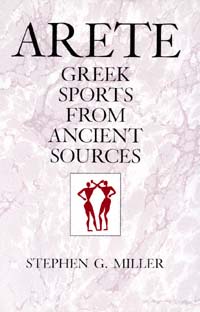 | Title: Arete: Greek sports from ancient sources Author: Miller, Stephen G Published: University of California Press, 1991 Subjects: Classics | Classical Literature and Language | History | Ancient History | Sports Publisher's Description: From the informal games of Homer's time to the highly organized contests of the Roman world, Miller has compiled a trove of ancient sources - Plutarch on boxing, Aristotle on the pentathlon, Philostratos on clay dust as an anti-perspirant and on the buying and selling of victories, Vitruvius on literary competitions, Xenophon on female body building. With fully twice as many texts as the highly successful first edition, this new version of Arete offers readers an absorbing lesson in the culture of Greek athletics from the greatest of teachers - the ancients themselves.These sources, which Miller himself has translated, provide unparalleled insights into ancient athletic practices and competitive festivals. They emphasize the fundamental role of athletics in education and shed light on such issues as the role of women in athletics and the politics and economics of the games. Ultimately they demonstrate that the concepts of virtue, skill, pride, valor, and nobility embedded in the word arete and so closely associated in the modern mind with Greek athletics are only part of the story from antiquity. [brief] Similar Items |
| 174. | 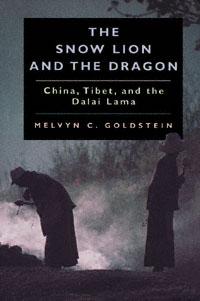 | Title: The snow lion and the dragon: China, Tibet, and the Dalai Lama Author: Goldstein, Melvyn C Published: University of California Press, 1997 Subjects: History | Politics | Asian History | China | Cultural Anthropology | Tibet Publisher's Description: Tensions over the "Tibet Question" - the political status of Tibet - are escalating every day. The Dalai Lama has gained broad international sympathy in his appeals for autonomy from China, yet the Chinese government maintains a hard-line position against it. What is the history of the conflict? Can the two sides come to an acceptable compromise? In this thoughtful analysis, distinguished professor and longtime Tibet analyst Melvyn C. Goldstein presents a balanced and accessible view of the conflict and a proposal for the future.Tibet's political fortunes have undergone numerous vicissitudes since the fifth Dalai Lama first ascended to political power in Tibet in 1642. In this century, a forty-year period of de facto independence following the fall of the Qing dynasty in 1911 ended abruptly when the Chinese Communists forcibly incorporated Tibet into their new state and began the series of changes that destroyed much of Tibet's traditional social, cultural, and economic system. After the death of Mao in 1976, the rise to power of Deng Xiaoping quickly produced a change in attitude in Beijing and a major initiative to negotiate with the Dalai Lama to solve the conflict. This failed. With the death of Deng Xiaoping, the future of Tibet is more uncertain than ever, and Goldstein argues that the conflict could easily erupt into violence.Drawing upon his deep knowledge of the Tibetan culture and people, Goldstein takes us through the history of Tibet, concentrating on the political and cultural negotiations over the status of Tibet from the turn of the century to the present. He describes the role of Tibet in Chinese politics, the feeble and conflicting responses of foreign governments, overtures and rebuffs on both sides, and the nationalistic emotions that are inextricably entwined in the political debate. Ultimately, he presents a plan for a reasoned compromise, identifying key aspects of the conflict and appealing to the United States to play an active diplomatic role. Clearly written and carefully argued, this book will become the definitive source for anyone seeking an understanding of the Tibet Question during this dangerous turning point in its turbulent history. [brief] Similar Items |
| 175. |  | Title: Latin America in the 1940's: war and postwar transitions Author: Rock, David 1945- Published: University of California Press, 1994 Subjects: History | Politics | Latin American History | Latin American Studies Publisher's Description: Latin America in the 1940s addresses the significant impact that World War II and the onset of the Cold War had on the political development of Latin America. During the middle of this crucial decade many Latin American countries turned from authoritarian regimes toward democracy and the rapid growth of labor unions. By the end of the decade, however, the fledgling democracies had collapsed, the unions were in shambles, and authoritarianism asserted itself once more. This collection of essays by an international group of historians, political scientists, economists, and sociologists confronts a central debate in Latin American studies: Were these events the immediate result of external forces - that is, of the war - or the culmination of internal movements that originated in the 1930s?This book is among the first in its field to evaluate the early Cold War period through the lens of the immediate post-Cold War era. While powerfully reinterpreting the brief resurgence of democracy in Latin America in the 1940s, it offers a comparative foundation from which to judge the renewed trend toward democracy that began in the 1980s and continues during the early 1990s. [brief] Similar Items |
| 176. |  | Title: The Enlightenment against the Baroque: economics and aesthetics in the eighteenth century Author: Saisselin, Rémy G. (Rémy Gilbert) 1925- Published: University of California Press, 1992 Subjects: History | Economics and Business | Popular Culture | Art | Renaissance History Publisher's Description: How do seemingly disparate arenas of Enlightenment philosophy, economic theories, boudoir etiquette, literary styles, and artistic modes coincide in the late eighteenth century? In this poetic essay on the evolution of the idea of luxury and art, Rémy Saisselin uses precise, witty examples to describe the development of our modern taste, ultimately the successor of the more spiritual and grand baroque goût . His analysis both illuminates and distinguishes between eighteenth-century and modern varieties of conspicuous consumption.This persuasive discourse depicts the rise of luxe as an escape from ennui and shows how, for the first time in European history, a large class of wealthy, leisured people emerged to make art, luxury, and the avoidance of boredom its preoccupation. Saisselin provides an original and lucid picture of the first phases in the emergence of a specifically bourgeois taste. [brief] Similar Items |
| 177. |  | Title: Religion and society in a Cotswold vale: Nailsworth, Gloucestershire, 1780-1865 Author: Urdank, Albion M Published: University of California Press, 1990 Subjects: History | European History Publisher's Description: During the English Industrial Revolution, the Vale of Nailsworth was a rural-industrial settlement and a center of evangelical Nonconformity. Why did the transition to the factory system bring deindustrialization and social decline rather than long-term advancement? Albion Urdank investigates the modernization of Nailsworth from many perspectives, revealing the experience and the mentalité of ordinary people in their ecological, economic, and social environments. His innovative approach, in the tradition of the Leicester and Annales schools, contributes to the historical literature on popular religion, secularization, local history, and European industrialization, and will appeal to a wide spectrum of interdisciplinary interests. [brief] Similar Items |
| 178. | 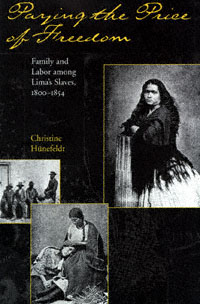 | Title: Paying the price of freedom: family and labor among Lima's slaves, 1800-1854 Author: Hünefeldt, Christine Published: University of California Press, 1995 Subjects: History | Anthropology | Latin American History | Latin American Studies Publisher's Description: Christine Hünefeldt documents in impressive, moving detail the striving and ingenuity, the hard-won triumphs and bitter defeats of slaves who sought liberation in nineteenth-century urban Peru. Drawing on judicial, ecclesiastical, and notarial records - including the testimony of the slaves themselves - she uncovers the various strategies slaves invented to gain their freedom.Hünefeldt pays particular attention to marriage relations and family life. Slaves used their family solidarity as a strategy, while slaveowners used the conflicts within families to prevent manumission. The author's focus on gender relations between slaveowners and slaves, as well as between slaves, is particularly original. Her eye for ethnographic detail and her perceptive reading of the documentary evidence make this book a rich and important contribution to the study of slavery in Latin America. [brief] Similar Items |
| 179. | 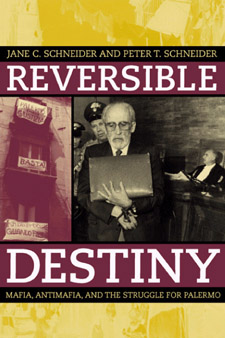 | Title: Reversible destiny: mafia, antimafia, and the struggle for Palermo Author: Schneider, Jane 1938- Published: University of California Press, 2003 Subjects: Anthropology | History | Politics | Criminology | Sociology Publisher's Description: Reversible Destiny traces the history of the Sicilian mafia to its nineteenth-century roots and examines its late twentieth-century involvement in urban real estate and construction as well as drugs. Based on research in the regional capital of Palermo, this book suggests lessons regarding secretive organized crime: its capacity to reproduce a subculture of violence through time, its acquisition of a dense connective web of political and financial protectors during the Cold War era, and the sad reality that repressing it easily risks harming vulnerable people and communities. Charting the efforts of both the judiciary and a citizen's social movement to reverse the mafia's economic, political, and cultural power, the authors establish a framework for understanding both the difficulties and the accomplishments of Sicily's multifaceted antimafia efforts. [brief] Similar Items |
| 180. | 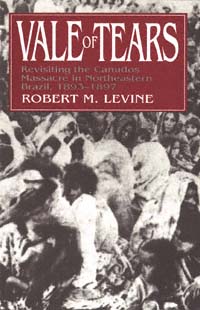 | Title: Vale of tears: revisiting the Canudos massacre in northeastern Brazil, 1893-1897 Author: Levine, Robert M Published: University of California Press, 1992 Subjects: History | Latin American Studies | Latin American History Publisher's Description: The massacre of Canudos In 1897 is a pivotal episode in Brazilian social history. Looking at the event through the eyes of the inhabitants, Levine challenges traditional interpretations and gives weight to the fact that most of the Canudenses were of mixed-raced descent and were thus perceived as opponents to progress and civilization.In 1897 Brazilian military forces destroyed the millenarian settlement of Canudos, murdering as many as 35,000 pious rural folk who had taken refuge in the remote northeast backlands of Brazil. Fictionalized in Mario Vargas Llosa's acclaimed novel, War at the End of the World , Canudos is a pivotal episode in Brazilian social history. When looked at through the eyes of the inhabitants of Canudos, however, this historical incident lends itself to a bold new interpretation which challenges the traditional polemics on the subject. While the Canudos movement has been consistently viewed either as a rebellion of crazed fanatics or as a model of proletarian resistance to oppression, Levine deftly demonstrates that it was, in fact, neither. Vale of Tears probes the reasons for the Brazilian ambivalence toward its social history, giving much weight to the fact that most of the Canudenses were of mixed-race descent. They were perceived as opponents to progress and civilization and, by inference, to Brazil's attempts to "whiten" itself. As a result there are major insights to be found here into Brazilians' self-image over the past century. [brief] Similar Items |